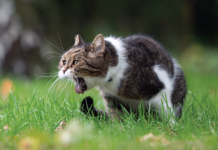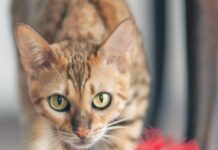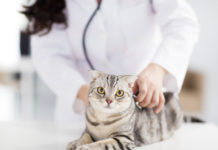Q. Dear Elizabeth: For the past year, my wife and I have used a scent diffuser, a little device that sprays a gentle, lavender-scented mist into the air. For some reason, the diffuser stopped working a while back, so we checked online to see where we could obtain a new one. In the course of our research, however, we read that the fumes released into the air by aromatherapy-based machines can be quite dangerous — possibly fatal — to cats. Is this true?
A. Aromatherapy, for readers who may not be acquainted with the term, is the practice of releasing the essences of various botanicals into the air for beneficial effects. Some essences are utilized as a form of alternative medicine and are said to ease pain, diminish inflammation, fight infection and reduce stress, among other things. Other essences are used, as is the case for you and your wife, for aesthetic purposes because they smell good. While the medicinal value of aromatherapy is debatable (and contested by some medical experts), there is no doubt that any household can get a pleasant boost from such delightful fragrances.
Most aromatherapy products are created by steam distillation. In this process, steam is forced through a plant creating such intense heat that it breaks down and releases aromatic compounds. When cooled in the final stages of production, these compounds separate out into two categories: the non-water soluble portion (or essential oil) and the water-soluble portion (or hydrosol). Both can be of value in providing a scent that you desire.
For hundreds of years, people have tried to capture fragrances. It began with dried bundles of herbs, or potpourri, left in dresser drawers, laundries, living rooms or bathrooms. Then came the burning aromatic candles. And now we have diffusers, which come in several varieties. Some are electric, aerosol-based devices, like the one that you described, which spray a fine mist of fragrance into the air. Others enclose a pad dabbed with essential oils; when plugged into an outlet, these diffusers release a constant fragrance.
Although essential oils and hydrosols are pleasing to our sense of smell, they are not all benign. Toxicities can and do occur — although inhalation is probably the least dangerous route. Most of the time, trouble arises when certain essential oils are accidentally ingested by, for example, a cat that has accidentally stepped in an oil and then grooms its paws. Several essential oils — including, but not limited to eucalyptus, fennel, hyssop, pennyroyal, rosemary and sage — can, if ingested, adversely affect a cat’s nervous system and cause it to have convulsions.
Lavender can also be toxic — primarily to a cat’s skin and gastrointestinal tract. For example, lavender-scented litter, which has been commercially available, can potentially cause irritation of a cat’s paw pads. If ingested, it can cause vomiting, anorexia and depression. This is because the feline liver lacks certain detoxifying enzymes that are present in other species. As a result, cats are significantly handicapped when it comes to metabolizing certain compounds — alcohols, phenols, terpenes and limonenes, for example. This means that it doesn’t take much of any of the above compounds to build up in the bloodstream and reach toxic levels. So you have to be exceptionally cautious when it comes to exposing your cats to lavender. In light of this, I would not recommend any free-standing oil candles; there is too much risk involved. Your kitties could spill the oil on their skin and be burned; or they could ingest the spilled oil when grooming.
Aerosol diffusers and those that contain hydrosols in lieu of essential oils are, however, considered to be relatively safe. They contain very dilute forms of the lavender compounds, and they emit the fragrance into the air as a mist rather than from a container that is open and easy for a nosy cat to access.
At the same time, you must be very careful if either of your cats has asthma or any kind of respiratory allergy, since even the lavender scent may trigger a flare-up. Be sure to store any essential oils in a safe place, and if your diffuser is leaking, get a replacement for it immediately. I would encourage you to have a talk with your vet about any other potential risks to your cats. I also suggest that you keep your local poison control center’s telephone number handy in case of any emergency that might arise. Overall, I would say that it is probably all right for you to continue using your lavender-scented diffuser in your home — but use it with appropriate care. Love, Elizabeth



